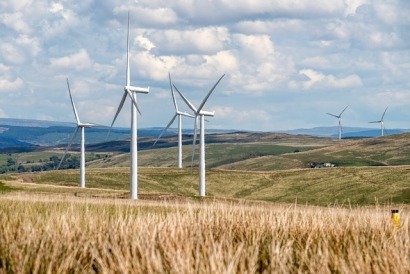
The announcement has the potential to make wind energy more accessible in Maine, according to USDA Rural Development Maine State Director Rhiannon Hampson.
“This partnership between USDA and DOE creates new funding, technical assistance, and research and development opportunities,” said Hampson. “In Maine, we already offer free technical assistance to farmers and small businesses pursuing distributed wind energy through our REAP TAG program. Thanks to the Inflation Reduction Act, and the new RAISE initiative, USDA will ensure that more farmers and other rural businesses can save money and earn income from distributed renewable energy technologies.”
In 2023 USDA Rural Development in Maine awarded a REAP Technical Assistance Grant (REAP TAG) of $152K to Pecos Wind Power Inc The company designs, builds, and sells wind turbines for distributed generation. Increasing the use of wind-generated power was one priority for the 2023 REAP TAG program, and the company was a successful applicant.
Native Mainer Josh Groleau, co-founder and CEO of Pecos Wind Power Inc., attended the Distributed Wind Energy Association conference in Arlington, Virginia, where the new RAISE initiative between USDA and DOE was announced by USDA Secretary Tom Vilsack.
“This is a very logical collaboration,” he said. “The DOE brings technical expertise and knowledge of wind turbine technology, while the USDA brings the needs and requirements of farmers. Together, the two agencies can bring serious economic benefit to farmers through the deployment of distributed wind power.”
USDA’s REAP TAG program is now in its second year. Maine Rural Development is accepting REAP TAG applications from technical assistance providers through March 15th, 2024.
Although people may imagine massive turbines on hillsides when thinking of wind power, so-called distributed wind projects vary in scope. A project might entail a single wind turbine to meet a farm’s energy demand and save and stabilize electricity costs. It could also include a few wind turbines across several farms to support a local electricity utility, thereby earning a revenue stream for the hosting farms.
Distributed clean energy projects can create cost savings and income for farmers and rural small businesses. They also support energy independence, local electric grid reliability, and enhance resilience by providing back up power, especially when it is paired with energy storage. These projects also create jobs and investments in rural economies, with approximately a third of a renewable energy project value usually invested in the local communities through construction jobs and maintenance. These projects also allow farmers, rural electric coops, and food companies to address climate change.
Initial RAISE initiative activities, focused on smaller-scale or distributed wind, are expected to include:

